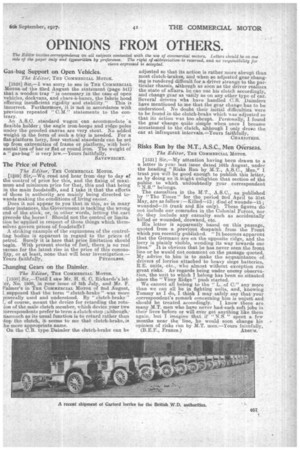OPINIONS FROM OTHERS.
Page 21

If you've noticed an error in this article please click here to report it so we can fix it.
The Editor invites correspondence on all subjects connected with the use of commercial motors. Letters should be on one side of the paper only and typewritten by preference. The right of abbreviationir reserved, and no responsibility for views expressed is accepted.
Gas-bag Support on Open Vehicles.
The Editor; THE COMMERCIAL MOTOR.
[1528] Sir,—I was sorry to see in THE COMMERCIAL Morroit of the 23rd August the statement (page 541) that a wooden tray "is necessary in the case of open vehicles, deckvans, and chars-a-banes, the fabric hood offering insufficient rigidity and stability.' This is incorrect,. Furthermore it is not in accordance with previous repeated " CAI." statements to the contrary.
An A.S.C. standard wagon can accommodate -a flexible holder ; the angle iron-hoops and ridge-poles under the proofed canvas are very stout. No added weight in the form of such a Vay is needed. For a flat-platform lorry, four vertical standards can be set up from extremities of frame or platform, with-horizontal ties of bar or flat or round iron. The weight of a " gas-bag" is very low.—Yours faithfully,
• SAVEWEICHT.
The Price of Petrol.
The Editor, THE COMMERCIAL MOTOR.
• [1529] Sir;—We read and hear from day to day of the control of price for this, and the fixing of maximum and minimum price for that, this and that being in the main foodstuffs, and I take it that the efforts of those in authority are mainly being directed towards making the conditions of living easier.
Does it not appear to you that in this, as in many other instances, the Government is tackling the wrong end of the stick, or, in other words, letting the cart precede the horse? Should not the control or limit& tion be applied in respect of those things which themselves govern prices of foodstuffs?
A striking example of the supineness of the controlling bodies is apparent in regard to the prices of petrol. Surely it is here that price limitation should begin. With present stocks of fuel, there is no real 3xcuse for the latest rise in the price of this comrnolity, or at least, none that will bear investigation.—
Yours faithfully, PETROLESS.
changing Gears on the Daimler.
The Editor, THE COMMIMICIAL. MOTOR.
[1530] Sir,—Until I saw Mr. H. S. C. Rickards's lether, No. 1500,. in your issue of 5th July, and Mr. F. Palmer's in THE COMMERCIAL MOTOR of 2nd August, supposed that the term " clutch-brake" was more generally used and understood. By "clutch-brake" of course, meant the device for retarding the rotaion of the male clutch member, which device your two x•rresponclents prefer to term a clutch-stop ; although,riasmuch as its usual function is to retard rather than ;top the clutch, it seems to me that clutch-brake. in he more appropriate name. On the C.B. type; Daimler the clutch-brake can be adjusted so that its action is rather more abrupt than most clutch-brakes, and when ao adjusted gear chang
ing is rendered difficult for a driver strange to the particular chassis, although as soon as the driver realizes the state of affairs,. he can use his clutch accordingly, and change gear as aasily as on any other type of car. Several drivers who have handled C.B. Daimlers have mentioned tome that the gear change has to be understood. No doubt their initial difficulties were to be found in•the clutch-brake which was adjusted so that its action was too abrupt. Personally, I found the gear change quite simple when once 1 became accustomed to the clutch, although I only drove the car at infrequent intervals.--Yours faithfully,
CHARIOTEER.
Risks Run by the M.T., A.S.C., Men Oferseas.
The Editor, THE COMMERCIAL MOTOR.
[1531] Sir,—My attention having been drawn to a a letter in your last issue dated 16th August, under the heading "Risks Run by M.T., A.S.C., Men," I trust you will be good enough to publish this letter, as by ;doing so it might enlighten that section of the public to which undoubtedly your correspondent "N.S." belongs.
The casualties in the A.S.C., as published by "The Times" for the period 2nd April to 31st May, are as follow —Killed-13 • died of wounds--is; wounded--18 (rank and file only). These figures do not include our comrades in the Colonial Forces, nor do they include any casualty such as accidentally killed or wounded, drowned, etc.
His letter is apparently based on this passage, quoted from a previous despatch from the Front which you recently pulalished. "It becomes apparent that the Germans are on the opposite ridge, and the lorry is plainly visible, wending its way towards our lines." It is obvious that he has never seen the front line or he would not comment on the passage quoted. My advice to him is to make the acquaintance of. drivers of lorries attached to heavy siege batteries, R.E. units, ;etc., who almost without exception run great risks. As regards being under enemy observation, the unit to which I belong has been so situated since the " Vitny Ridge" push started. We cannot all belong to the "1. of C." any more than we can all he in fighting units, and, knowing Tommy as I do, I think I may safely say that -your correspondent's remark concerning him is unjust and should be treated accordingly. I know there are many M.T. men who have never hachsuch soft jobs in their lives before or will ever get anything like them again. but I imagine that if " N.S. " spent a few months near the line, he would soon change his opinion of risks run by M.T. men.—Yours faithfully, (B. E. F. , France.) Ansum.
























